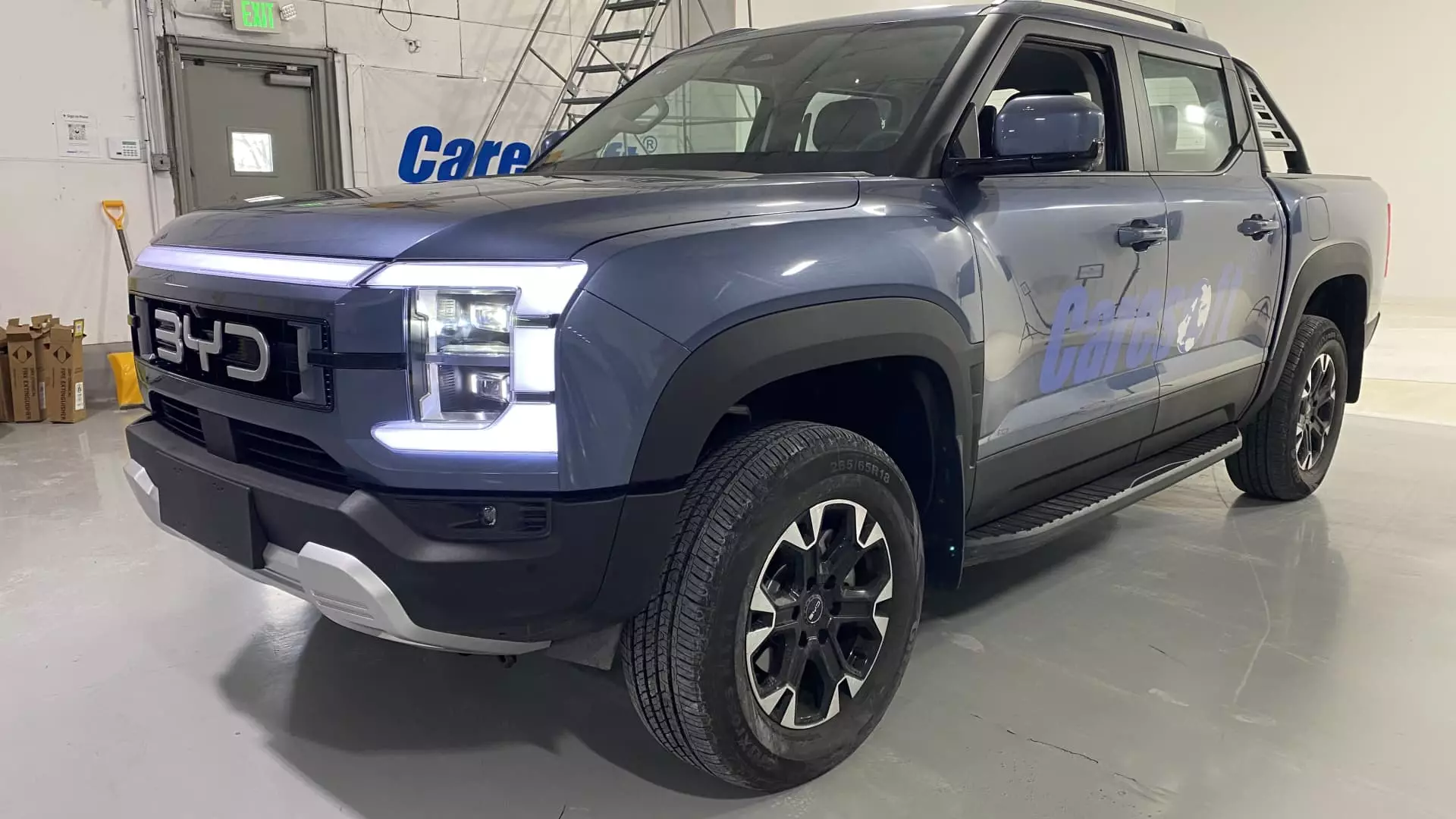In the ever-evolving automotive landscape, the emergence of Chinese automaker BYD Auto reveals significant shifts in global production and competition. With the introduction of the BYD Shark—a midsize pickup truck that could easily be mistaken for an American-made vehicle—the stakes have never been higher for traditional American automakers. As BYD seeks to expand its portfolio and influence, it raises crucial questions about market dynamics and consumer preferences in the automotive sector.
The BYD Shark’s design strongly echoes established American brands, particularly Ford. Its exterior aesthetic can easily be likened to a Ford Explorer or even the popular F-150, highlighting an overt attempt to capture familiarity among potential buyers. Such design choices may be strategic, drawing consumers who favor the iconic styling of American trucks while simultaneously challenging the status quo of a market long dominated by household names like Ford and Toyota. The distinct blend of familiar attributes with innovative engineering creates a unique brand experience that could engage customers in selective international markets.
The international pickup truck market, particularly in the U.S., remains a goldmine for automakers, given the impressive sales volumes associated with such vehicles. For American companies, pickups represent a significant revenue stream, making them increasingly vigilant of emerging competitors like BYD. The concern is palpable; with BYD’s track record of producing affordable vehicles such as the sub-$10,000 Seagull hatchback, there’s a fear that their entry into markets traditionally dominated by American automakers might ignite price wars detrimental to local manufacturers.
Although BYD hasn’t signaled an intention to launch the Shark in the U.S. yet, they are already making waves in regions such as Australia, Mexico, and Brazil—each vital markets where companies like General Motors and Toyota have a stronghold. It raises the question of how long domestic automakers can rely on brand loyalty and tradition before they must innovate to maintain consumer interest.
The pickup truck segment is not merely a commodity; it serves as an emblem of American culture. As Terry Woychowski, president of Caresoft Global, points out, these vehicles bring considerable revenue and embody the franchise’s importance within manufacturer lineups. Given the alluring profit margins associated with trucks, companies must carefully strategize to respond to competition like BYD, which has demonstrated a robust capacity for innovation and efficiency.
Toyota has expressed similar sentiments, reinforcing the need for adaptability in the face of competition. Chairman Akio Toyoda emphasized the importance of understanding and responding to global market needs, indicating a recognition of the changing tides in consumer preferences and the increasing presence of foreign automakers.
Innovation and Technology: Hybrid Powertrain Dynamics
What sets the BYD Shark apart in the market is its hybrid powertrain, which amalgamates traditional internal combustion engine technology with electric vehicle components. This allows for a versatile driving experience that caters to a broader audience. The hybrid engine, combined with an impressive range of over 500 miles, can effectively meet the needs of consumers seeking sustainability without compromising performance.
However, while the Shark boasts impressive specifications, industry insiders have noted that certain features could benefit from refinement. Woychowski’s assessment of the Shark’s interior and ride dynamics highlighted areas for improvement, suggesting BYD must prioritize innovation and quality if it aims to compete seriously with established players in the U.S. market.
Market Entry Strategy: Exporting Success
With a strategic focus on exports, BYD has significantly ramped up its share in the global vehicle market. Their growth trajectory—from a mere 2% of exports in 2022 to an anticipated 8% in 2024—demonstrates a calculated approach to international expansion. Analysts foresee an even greater increase in the sales volume, estimating BYD will reach about 5.5 million vehicles this year.
This export-driven growth not only boosts BYD’s revenue but also functions as a formidable barrier against domestic manufacturers accustomed to their traditional market dynamics. High-volume sales in Latin America and selective global regions could displace competitors who underestimate the potential of the Shark.
As the automotive industry navigates an era defined by electric and hybrid technologies, BYD’s Shark serves as a wake-up call for traditional manufacturers. It is evident that automakers like Ford and Toyota must embrace change, investing in innovation and remaining responsive to market demands. The Shark represents more than just another pickup truck; it embodies the pressures and opportunities inherent in a rapidly changing global marketplace. As competition intensifies, consumer choice may well dictate the future of the automotive industry, making it crucial for all players to adapt or risk obsolescence.

